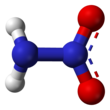Nitramide or nitroamine is a chemical compound with the molecular formula H2N−NO2. Substituted derivatives R1R2N−NO2 are termed nitramides or nitroamines as well. Organyl derivatives of nitramide, R−NH−NO2 and R2N−NO2, are widely used as explosives: examples include RDX and HMX. It is an isomer of hyponitrous acid. Nitramide can be viewed as a nitrogen analog of nitric acid (HO−NO2), in which the hydroxyl group −OH is replaced with the amino group −NH2.

| |||
| |||
| Names | |||
|---|---|---|---|
| IUPAC name
Nitramide
| |||
| Systematic IUPAC name
Nitric amide | |||
| Other names | |||
| Identifiers | |||
3D model (JSmol)
|
|||
| ChEBI | |||
| ChemSpider | |||
PubChem CID
|
|||
| UNII | |||
CompTox Dashboard (EPA)
|
|||
| |||
| |||
| Properties | |||
| H2N−NO2 | |||
| Molar mass | 62.028 g·mol−1 | ||
| Appearance | Colorless solid[2] | ||
| Density | 1.378 g/cm3 | ||
| Melting point | 72 to 75 °C (162 to 167 °F; 345 to 348 K)[2] | ||
| Acidity (pKa) | 6.5[3] | ||
| Related compounds | |||
Related compounds
|
|||
Except where otherwise noted, data are given for materials in their standard state (at 25 °C [77 °F], 100 kPa).
| |||
Structure
editThe nitramide molecule is essentially an amine group (−NH2) bonded to a nitro group (−NO2). It is reported to be non-planar in the gas phase,[4] but planar in the crystal phase.[2]
Synthesis
editThiele and Lachman's original synthesis of nitramide involved the hydrolysis of potassium nitrocarbamate:[2]
Other routes to nitramide include hydrolysis of nitrocarbamic acid,
- O2N−NH−CO2H → H2N−NO2 + CO2
reaction of sodium sulfamate with nitric acid,
and reaction of dinitrogen pentoxide with two equivalents of ammonia.
- N2O5 + 2 NH3 → H2N−NO2 + [NH4]+NO−3
Organic nitramides
editAlso called nitramines, organic nitramides are important explosives. They are prepared by nitrolysis of hexamethylenetetramine.
References
edit- ^ a b "Nitramide".
- ^ a b c d Häußler, A.; Klapötke, T. M.; Piotrowski, H. (2002). "Experimental and Theoretical Study on the Structure of Nitramide H2NNO2" (PDF). Zeitschrift für Naturforschung. 57 b (2): 151–156. doi:10.1515/znb-2002-0204.
- ^ Perrin, D. D., ed. (1982) [1969]. Ionisation Constants of Inorganic Acids and Bases in Aqueous Solution. IUPAC Chemical Data (2nd ed.). Oxford: Pergamon (published 1984). Entry 154. ISBN 0-08-029214-3. LCCN 82-16524.
- ^ Tyler, J. K. (1963). "Microwave Spectrum of Nitramide". Journal of Molecular Spectroscopy. 11 (1–6): 39–46. Bibcode:1963JMoSp..11...39T. doi:10.1016/0022-2852(63)90004-3.

